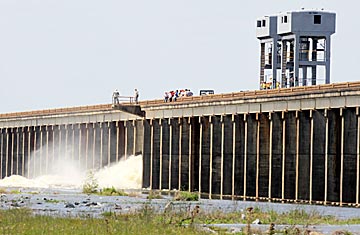
Water diverted from the Mississippi River spills through a bay in the Morganza Spillway in Morganza, La., May 14, 2011.
On Saturday afternoon, Sandra Kelly, a 53-year-old cook, stood along the Atchafalaya (pronounced: Attach-uh-fah-la-ya) River, which connects the Mississippi River to the Gulf of Mexico, and sighed. The U.S. Army Corps of Engineers, manager of much of the nation's water system, had just opened a spillway north of here, mainly to keep the bloated Mississippi's waters from toppling levees into cities, particularly the state's capital, Baton Rouge, and New Orleans. "I don't know how they decide who to sacrifice," Kelly said, between slurps of a cherry snowball. "We don't know what's going to happen," she added, "but I'm scared."
As are many of her neighbors here in Berwick, about a 90-minute drive west of New Orleans. The town (pop. 4,262) lies in the heart of Cajun country, at the base of the Atchafalaya River basin. It's a key passageway for boats hauling food and other supplies to Louisiana's offshore oilrigs. So many different stories are circulating through town. There's talk that residents will have to evacuate (at this point, it's voluntary). Some say Berwick and its larger neighbor across the river, Morgan City, are doomed in part because the spillway will be opened for several weeks. Despite the looming threat, people here are trying to carry on with their lives. On Saturday, old women casually browsed the aisles of a supermarket. Children played in the pool of the local Holiday Inn — never mind the breezy, unseasonably cool temperatures.
Much of the news in recent weeks has been dominated by efforts to tame the unusually rapid spring rise of the Mississippi River. In southern Missouri, federal authorities punctured a levee to save river towns like Cairo, Illinois. Parts of Memphis, Tenn., flooded. In Mississippi, the governor, Haley Barbour, declared much of the state's Delta region a disaster zone, and bluntly told residents: "Evacuate to save your own life." Two barges struck a bridge crossing the Mississippi River in Baton Rouge. In largely rural St. Mary's Parish, as Louisiana counties are officially known, the authorities have desperately devised their own flood-prevention strategy: Plunging a massive metal sheet into a river, propped by a set of sunken barges, hoping to push water into nearby swamps. On Sunday, officials in another rural parish, St. Landry, about an hour's drive west of Baton Rouge, ordered residents in low-lying areas to evacuate.
For weeks, officials had debated how to prevent the Mississippi River from overwhelming New Orleans, a city still recovering from the effects of Hurricane Katrina. One option was to open the Morganza Spillway, a damn-like structure built in the early 1950 mainly to relieve pressure on the mighty Mississippi. The Morganza, as the spillway is known, has been opened only once before, in 1973. The decision to open the spillway on Saturday afternoon means that some 3,000 square miles of verdant, sparsely populated farmland will flood. It was no doubt a grueling decision, but shouldn't be all that surprising: each year, the federal government sends written notices warning people within the Atchafalaya River basin that the Morganza could be opened.
Louis Hebert, a 55-year-old electrical engineer, stood along the banks of the Atchafalaya, and recalled one of Berwick's last major floods, in the early 1970s. Back then, he sat atop the floodwalls, dangling his feet in the water. Massively tall new floodwalls have since been built, but he's still concerned. That's because by Saturday afternoon, the Atchafalaya was already more than three feet above the level considered "flood stage." The authorities warn that by Wednesday water may cross the floodwalls — sending water into the neighborhood of trailers and modest homes that line Texas Street. Hebert's mother-in-law lives in one of the trailers. But the water may come sooner: The Atchafaya remains open to boat traffic. So every boat that passes, he fears, could push water into the neighborhood. "All these folks can do," he said, "is pray."
